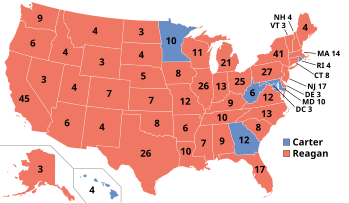United States elections, 1980
| Presidential election year | |
| Election day | November 4 |
|---|---|
| Presidential election | |
| Electoral vote | |
| Ronald Reagan (R) | 489 |
| Jimmy Carter (D) | 49 |
| Presidential election results map. Red denotes states/districts won by Republican Ronald Reagan, and Blue denotes those won by Democrat Jimmy Carter. Numbers indicate electoral votes allotted to the winner of each state. | |
| Senate elections | |
| Seats contested | 34 seats of Class III |
| Net change | Republicans +12 (Republicans gain control) |
 |
|
| 1980 Senate election results map | |
| House elections | |
| Seats contested | All 435 seats |
| Net change | Republicans +34 (Democrats retain control) |
 |
|
| 1980 House election results map | |
| Gubernatorial elections | |
| Seats contested | 15 (13 states, 2 territories) |
| Net change | Republican +4 |
 |
|
| 1980 Gubernatorial election results map | |
| Legend | |
|
Democratic hold
Democratic pickup
Republican pickup
Republican hold
Independent hold
|
|
The 1980 United States elections was held on November 4. These included the 49th presidential election, Senate elections (where 34 seats were decided), and House of Representatives elections (to elect all 435 members of the House for the 97th United States Congress). Other elections were held as well.
The elections saw sweeping gains by the Republican Party in the Senate, House, and in numerous gubernatorial and state races. Republican former California Governor Ronald Reagan defeated Democratic incumbent President Jimmy Carter in a landslide. Additionally, the Republicans gained control of the Senate for the first time in 28 years, and increased their numbers in the House. The Republicans also gained four seats in governors' races.
The wins by Reagan and the Republicans marked the beginning of what is popularly called the "Reagan Revolution" or Reagan Era, and signified a conservative realignment in national politics.
The United States in the 1970s underwent "stagflation"—a wrenching period of low economic growth, high inflation and high interest rates and intermittent energy crises. These issues played a large role in the 1980 campaign.
While during Barry Goldwater's 1964 campaign, many voters saw his warnings about a too-powerful government as hyperbolic and only 30% of the electorate agreed that government was too powerful, by 1980 a majority of Americans believed that government held too much power.
...
Wikipedia


